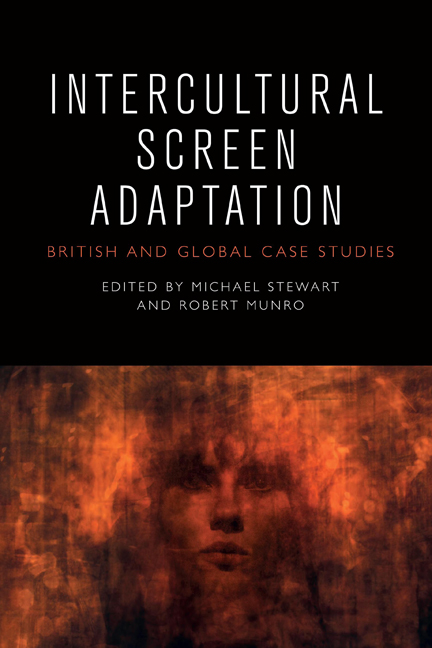Book contents
- Frontmatter
- Contents
- List of Illustrations
- Acknowledgements
- List of Contributors
- Introduction
- PART I NOSTALGIA, HERITAGE AND THE TOURIST GAZE
- 1 Adapting Pagnol and Provence
- 2 ‘A Tourist in Your Own Youth’: Spatialised Nostalgia in T2: Trainspotting
- 3 ‘200 Miles Outside London’: The Tourist Gaze of Far from the Madding Crowd
- PART II RADICAL CONTINGENCIES: NEGLECTED FIGURES AND TEXTS
- 4 Reframing Performance: The British New Wave on Stage and Screen
- 5 Why We Do Not Adapt Jean Rhys
- PART III RE-ENVISIONING THE NATIONAL IMAGINARY
- 6 ‘To see oursels as ithers see us’: Textual, Individual and National Other-selves in Under the Skin
- 7 Back to the Future: Recalcitrance and Fidelity in Julieta
- PART IV THE LOCAL, THE GLOBAL AND THE COSMOPOLITAN
- 8 El Patrón Del Mal: A National Adaptation and Narcos Precedent
- 9 Constructing Nationhood in a Transnational Context: BBC’s 2016 War and Peace
- 10 The Beautiful Lie: Radical Recalibration and Nationhood
- PART V REMAKING, TRANSLATING: DIALOGUES ACROSS BORDERS
- 11 In Another Time and Place: Translating Gothic Romance in The Handmaiden
- 12 Chains of Adaptation: From D’entre les morts to Vertigo, La Jetée and Twelve Monkeys
- 13 A ‘Double Take’ on the Nation(al) in the Dutch-Flemish Monolingual Film Remake
- Index
3 - ‘200 Miles Outside London’: The Tourist Gaze of Far from the Madding Crowd
Published online by Cambridge University Press: 22 September 2020
- Frontmatter
- Contents
- List of Illustrations
- Acknowledgements
- List of Contributors
- Introduction
- PART I NOSTALGIA, HERITAGE AND THE TOURIST GAZE
- 1 Adapting Pagnol and Provence
- 2 ‘A Tourist in Your Own Youth’: Spatialised Nostalgia in T2: Trainspotting
- 3 ‘200 Miles Outside London’: The Tourist Gaze of Far from the Madding Crowd
- PART II RADICAL CONTINGENCIES: NEGLECTED FIGURES AND TEXTS
- 4 Reframing Performance: The British New Wave on Stage and Screen
- 5 Why We Do Not Adapt Jean Rhys
- PART III RE-ENVISIONING THE NATIONAL IMAGINARY
- 6 ‘To see oursels as ithers see us’: Textual, Individual and National Other-selves in Under the Skin
- 7 Back to the Future: Recalcitrance and Fidelity in Julieta
- PART IV THE LOCAL, THE GLOBAL AND THE COSMOPOLITAN
- 8 El Patrón Del Mal: A National Adaptation and Narcos Precedent
- 9 Constructing Nationhood in a Transnational Context: BBC’s 2016 War and Peace
- 10 The Beautiful Lie: Radical Recalibration and Nationhood
- PART V REMAKING, TRANSLATING: DIALOGUES ACROSS BORDERS
- 11 In Another Time and Place: Translating Gothic Romance in The Handmaiden
- 12 Chains of Adaptation: From D’entre les morts to Vertigo, La Jetée and Twelve Monkeys
- 13 A ‘Double Take’ on the Nation(al) in the Dutch-Flemish Monolingual Film Remake
- Index
Summary
The British film industry provides well-known benefits for national tourism, with its ample opportunities to exhibit the nation at its best (Creative England 2015). ‘Period’ or ‘costume’ dramas are a particularly prominent example of this, exploiting Britain's history by the display of attractive historical buildings and apparently timeless landscapes. These dramas utilise a clearly nationalistic approach in the idealised aesthetic choices, as well as in the use of celebrated British literature or the lives of famous British figures as the sources for many period films. However, despite the apparently nationalist stance of the material, recent years have seen a number of foreign directors taking the helm of period films with a British setting. One of the major benefits of this trend, at least from a marketing point of view, is that it presents the opportunity to package the films as fresh, original takes on what are often highly familiar subjects. With the Scandinavian film and television industries proving highly influential over the last decade or more, Andrew Pulver (2015) notes the ‘current fad for bringing in Scandi directors to freshen up British period pieces’, citing The Imitation Game (Morten Tyldum, UK/US, 2014) and Tinker Tailor Soldier Spy (Tomas Alfredson, France/UK/Germany, 2011) as examples. To this we could add Lone Scherfig's work on An Education (UK/US, 2009) and Their Finest (UK/Sweden, 2017). If we were to spread the net further afield we might also include US director Cary Fukunaga's work on Jane Eyre (UK/ US, 2011) and Jane Campion, of New Zealand and Australian heritage, with her Keats biopic Bright Star (UK/Australia/France, 2009), as further examples of foreign directors who have brought their vision to bear on quintessentially British subjects.
Thomas Vinterberg's adaptation of Hardy's Far from the Madding Crowd (UK/US, 2015) would also seem to follow this pattern, with the Danish Dogme 95 co-founder appearing on the surface to be an unusual choice for an adaptation of British canonical literature. Many commentators, most notably Andrew Higson (2011), have described the ways in which representations of Britain, or England, in film have an ideological role in constructing the way we view ourselves, or are viewed, as a nation.
- Type
- Chapter
- Information
- Intercultural Screen AdaptationBritish and Global Case Studies, pp. 46 - 64Publisher: Edinburgh University PressPrint publication year: 2020



